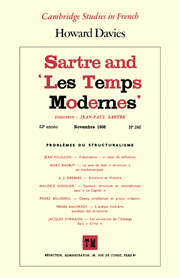Book contents
- Frontmatter
- Contents
- GENERAL EDITOR'S PREFACE
- Preface
- Acknowledgements
- Introduction
- 1 The first six years: the participation of Leiris and Lévi-Strauss
- 2 From 1951 to 1956: the rise of structuralism
- 3 Algeria: intellectual rivalries in time of war
- 4 The critique of academic knowledge
- Conclusion
- Appendix 1 Composition of the Editorial Board
- Appendix 2 Circulation figures
- Appendix 3 Categories of material to be found in Les Temps Modernes
- Appendix 4 Articles pertaining to academic anthropology
- Appendix 5 Special issues
- Notes
- Select bibliography
- Name index
- Subject index
- Cambridge Studies in French
1 - The first six years: the participation of Leiris and Lévi-Strauss
Published online by Cambridge University Press: 05 February 2012
- Frontmatter
- Contents
- GENERAL EDITOR'S PREFACE
- Preface
- Acknowledgements
- Introduction
- 1 The first six years: the participation of Leiris and Lévi-Strauss
- 2 From 1951 to 1956: the rise of structuralism
- 3 Algeria: intellectual rivalries in time of war
- 4 The critique of academic knowledge
- Conclusion
- Appendix 1 Composition of the Editorial Board
- Appendix 2 Circulation figures
- Appendix 3 Categories of material to be found in Les Temps Modernes
- Appendix 4 Articles pertaining to academic anthropology
- Appendix 5 Special issues
- Notes
- Select bibliography
- Name index
- Subject index
- Cambridge Studies in French
Summary
It is only in 1951 that structuralism first begins to be perceived as a rival methodology with terms of reference that are incompatible with the phenomenological approach. The first six years, although packed with incident, are years of harmony and co-operation as far as the synthetic and academic anthropologies are concerned. Little material of the latter category is to be found in the review – no more than 2% of TM's output, in fact – and the reasons for this lie primarily in the state of the discipline. There are a number of significant factors that together prompt practitioners to engage in an urgent quest for disciplinary identity: the disruption occasioned by the war; the possibility that a change in the nature of the relationship of metropolis and colonies might affect the object of study, perhaps to the point of causing it to vanish altogether; the problematic character of the boundaries separating anthropology from other closely related areas; and, last but not least, anthropology's very tenuous foothold in French higher education. In 1945, the theoretical and methodological basis provided by Mauss stands in need of innovative consolidation. With TM seeking to establish itself at the same time, it is not surprising that mutual support should be offered and that certain influential figures should be prominent in both ventures.
- Type
- Chapter
- Information
- Sartre and 'Les Temps Modernes' , pp. 13 - 39Publisher: Cambridge University PressPrint publication year: 1987

